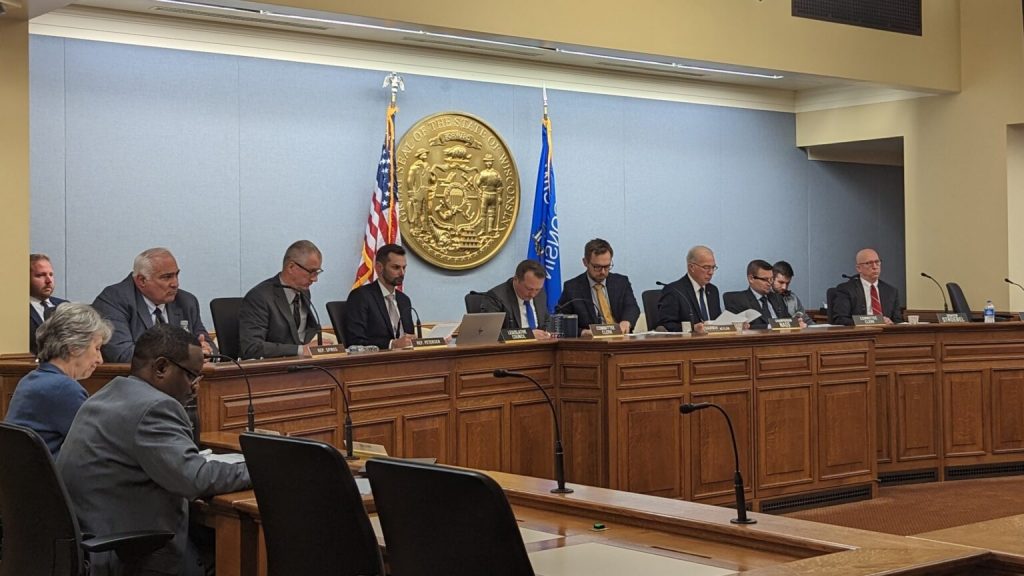State Supreme Court Will Review Lawmaker’s Power To Block Administrative Rules
Gov. Tony Evers' lawsuit says Legislature has acted unconstitutionally.

The Joint Committee for the Review of Administrative Rules at a meeting in January 2023. The Wisconsin Supreme Court will take up Gov. Tony Evers’ legal challenge to the power of the committee to block administrative rules issued by the executive branch. (Baylor Spears | Wisconsin Examiner)
The Wisconsin Supreme Court said Wednesday that justices will consider whether state lawmakers have overstepped their bounds in rejecting administrative rules enacted by the administration of Gov. Tony Evers.
The Court, in an unsigned order, said justices will take up the issue raised by Evers in a lawsuit the governor filed in October 2023 against Republican leaders in the Legislature.
The lawsuit sets out three separate issues in which it charges lawmakers with exercising an unconstitutional “legislative veto” that usurps the power of the state’s chief executive.
In July, the Court addressed the first of those issues when it ruled that laws giving the Legislature’s Joint Finance Committee the power to block spending decisions by the state’s Knowles-Nelson stewardship fund were unconstitutional. After issuing that decision the Court asked parties to the lawsuit to submit memos about the remaining issues in the suit.
Wednesday the Court said it will take up the third issue in the Evers lawsuit — challenging “indefinite objections” by the Joint Committee for the Review of Administrative Rules (JCRAR) that threw out a state regulation barring LGBTQ conversion therapy and blocked a rewrite of Wisconsin’s commercial building code.
State law authorizes the committee to block administrative rules, first by passing a committee vote rejecting the rule, then by introducing legislation blocking the rule. The rule then remains blocked for the rest of the Legislature’s two-year session — unless the bill blocking it is voted down by the full Legislature or, if it passes, is vetoed by the governor.
It has become common practice for lawmakers who want to block a rule to introduce the legislation blocking it, then bury the bill so that it never gets a vote or an opportunity to be vetoed.
In October 2023, JCRAR blocked an update to the state’s building code that advocates said would have included new energy efficiency standards. The building code update had been developed by the state Department of Safety and Professional Services (DSPS) following international standards.
The committee acted after an industry group raised objections with lawmakers — objections that the code’s advocates said were never raised in the public hearings held before DSPS issued the final code.
In January 2023, JCRAR blocked an ethics rule for therapists that banned conversion therapy — counseling to change a person’s sexual orientation or gender identity. The practice has been widely discredited as harmful to the people who undergo such counseling.
The ethics rule had been approved by the state Marriage and Family Therapy, Professional Counseling, and Social Work Examining Board, one of many licensing boards for which DSPS is the administrator.
Evers’ lawsuit questions whether the veto power that state law grants the committee violates the state constitution’s separation of powers — either overall, or specifically in limiting the authority that state law gives DSPS or the therapists’ professional board.
The legal memo filed with the lawsuit observes that the Wisconsin constitution requires legislation to pass two houses — bicameralism — and to be formally presented to the governor, who can sign or veto the measure. Those principles are to ensure laws are enacted “for the public good,” the memo states.
“Courts have broadly recognized that blocking executive branch agencies’ rules violates bicameralism and presentment procedures and infringes on executive and judicial authority,” the Evers lawsuit states.
When the Court first took up the lawsuit, the justices limited their focus to the first issue, on the Knowles-Nelson fund.
State law authorizes the Wisconsin Department of Natural Resources (DNR) to decide what properties to buy from the stewardship fund, which is part of the state budget. But additional laws enacted since 2007 subjected the fund’s spending decisions to review — and potential rejections — by the committee.
“We conclude these statutes interfere with the executive branch’s core function to carry out the law by permitting a legislative committee, rather than an executive branch agency, to make spending decisions for which the legislature has already appropriated funds and defined the parameters by which those funds may be spent,” wrote Justice Rebecca Bradley in the 6-1 decision.
Also Wednesday, the Court dismissed the lawsuit’s other issue — its objection to the Legislature’s employment relations committee’s delay in approving pay raises for Universities of Wisconsin employees.
The delay ended less than two months after the suit was filed, a likely reason for the Court to take a pass on the dispute, although Wednesday’s order did not explain the dismissal.
Assembly Speaker Robin Vos (R-Rochester) had blocked a committee vote on the raises, demanding that the UW system eliminate diversity, equity and inclusion (DEI) programs.
After Vos and the UW administration agreed to a resolution that included “reimagining” diversity, equity and inclusion efforts on campuses, the Joint Committee on Employee Relations (JCOER) reconvened and approved the UW raises.
State Supreme Court will take up lawmakers’ power to block administrative rules was originally published by Wisconsin Examiner.





















Excited for this ruling. Will be nice to actually have the Governor allowed to perform his own job.